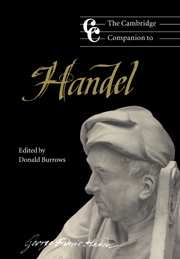Book contents
- Frontmatter
- Introduction
- Part I Background
- 1 Germany – education and apprenticeship
- 2 Italy – political andmusical contexts
- 3 Handel's London – political, social and intellectual contexts
- 4 Handel's London – the theatres
- 5 Handel's London – British musicians and London concert life
- 6 Handel's London – Italian musicians and librettists
- 7 Handel's English librettists
- Part II The music
- Part III The music in performance
- Bibliographical note
- Notes
- List of Handel's works
- Index
7 - Handel's English librettists
from Part I - Background
Published online by Cambridge University Press: 28 September 2011
- Frontmatter
- Introduction
- Part I Background
- 1 Germany – education and apprenticeship
- 2 Italy – political andmusical contexts
- 3 Handel's London – political, social and intellectual contexts
- 4 Handel's London – the theatres
- 5 Handel's London – British musicians and London concert life
- 6 Handel's London – Italian musicians and librettists
- 7 Handel's English librettists
- Part II The music
- Part III The music in performance
- Bibliographical note
- Notes
- List of Handel's works
- Index
Summary
None of Handel's English writers could be described as professional librettists in the sense of making their living by writing librettos, though all of them except the wealthy Charles Jennens (1700–73) had to earn their livings. It is not certain whether oratorio libretto-writing was a money-earning activity; we do not know if librettists shared in composers' benefit nights, or if there was a royalty arrangement on the sale of wordbooks. As with other forms of writing, there could be an expectation of financial return from a dedication. Thomas Morell (1703–84) dedicated his first libretto, Judas Maccabaeus, to the Duke of Cumberland, ‘as a compliment … upon his returning victorious from [quelling the Rebellion in] Scotland’, and was rewarded with ‘a handsome present’. Some phrases of Handel's suggest that he may usually have paid his English librettists. Having received the second instalment of the libretto of Belshazzar he writes to the author, Charles Jennens: ‘I profess my Self highly obliged to You, for so generous a Present’, and once the final instalment has arrived, he reiterates his ‘grateful acknowledgments for your generous favours’, which implies gratitude for something not only estimable but not ordinarily given. But libretto-writing was only one intermittent activity among many others for Handel's English collaborators; none was as fully engaged in this occupation as, for example, Paolo Rolli was with Italian opera librettos. Only John Gay (1685–1732) and Samuel Humphreys (c. 1698–1738), the earliest collaborators, were writers to the exclusion of other occupations.
- Type
- Chapter
- Information
- The Cambridge Companion to Handel , pp. 92 - 108Publisher: Cambridge University PressPrint publication year: 1997
- 1
- Cited by



